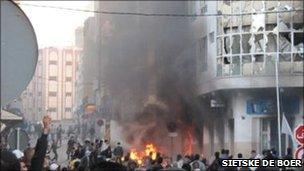Morocco protests: Five burned bodies found - minister
- Published

Several buildings were attacked on Sunday in the northern town of al-Hoceima
Five burned bodies have been found in a bank which was set on fire following anti-government protests in Morocco on Sunday, the interior minister has said.
Taib Cherkaoui said the bodies were discovered in the northern town of al-Hoceima.
He said the protests in al-Hoceima and other towns and cities were peaceful, but added that acts of vandalism and looting took place after the rallies.
The protesters demanded that King Mohammed VI give up some of his power.
So far there has been no independent confirmation of the deaths in al-Hoceima, and it is not clear how the five may have died.
Problems lurking
Journalist Sietske de Boer in al-Hoceima told the BBC that crowds of young men came from outside the town and began ransacking banks, shops and government buildings on Sunday.
Protests have spread across the region since popular movements in Tunisia and Egypt forced out leaders.
However, analysts say that - unlike other countries that have seen protests - Morocco has a successful economy, an elected parliament and a reformist monarchy, making it less vulnerable to a major uprising.
Former BBC Morocco correspondent Richard Hamilton says regular protests are allowed and the government has promised to double food subsidies.
But beneath the surface real problems are lurking, he adds.
Morocco has a huge young population, many of them poor or unemployed.
The gap between rich and poor has been described by one commentator as "obscene" and parliamentary elections are said by critics to be a fig leaf for an undemocratic system, our correspondent says.
King Mohammed is a member of the Alawite dynasty that has been ruling Morocco for some 350 years, claiming a direct line of descent from the Prophet Muhammad.
It is regarded as almost sacrilegious to question his role as king, our correspondent says.